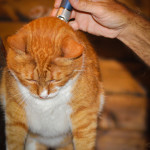- We are pleased to announce that we can now provide non surgical Laser therapy for your pets from our Ealing surgery, using a state of the art Class 4 laser. These are widely used in human medicine and can now be used to benefit your dog or cat.
- This can be particularly useful in both dogs and cats for arthritis, to speed wound healing or recovery from general surgery or after fracture treatment, lick granulomas in dogs, chronic gingivitis in cats, and for many other conditions. It is a quick and painless procedure and can be performed as an out-patient in our nurse clinics.
- Please phone our Ealing surgery for further details or to make an appointment on 0208 5670711.
Healing your pain… changing your life.
About K-Laser
What is Laser Therapy?
Laser Therapy, or “photobiomodulation”, is the use of specific wavelengths of light (red and near-infrared) to create therapeutic effects. These effects include improved healing time, pain reduction, increased circulation and decreased swelling. Laser Therapy has been widely utilized in Europe by physical therapists, nurses and doctors as far back as the 1970’s. Now, after FDA clearance in 2002, Laser Therapy is being used extensively in the United States.
Patient Benefits of Laser Therapy
Laser Therapy is proven to biostimulate tissue repair and growth. The Laser accelerates wound healing and decreases inflammation, pain, and scar tissue formation. In the management of chronic pain Class IV Laser Therapy can provide dramatic results, is non-addictive and virtually free of side effects.
Has effectiveness been demonstrated scientifically?
Yes. There are thousands of published studies demonstrating the clinical effectiveness of Laser Therapy. Among these, there are more than one hundred rigorously controlled, scientific studies that document the effectiveness of laser for many clinical conditions.
Cellular Effects of Laser Therapy
During Laser Therapy the infrared laser light interacts with tissues at the cellular level and metabolic activity increases within the cell, improving the transport of nutrients across the cell membrane. This initiates the production of cellular energy (ATP) that leads to a cascade of beneficial effects, increasing cellular function and health.
Laser Therapeutic Effects
During each painless treatment laser energy increases circulation, drawing water, oxygen, and nutrients to the damaged area. This creates an optimal healing environment that reduces inflammation, swelling, muscle spasms, stiffness, and pain. As the injured area returns to normal, function is restored and pain is relieved.
How many treatments does it take? This depends on the nature of the condition being treated. For some acute conditions 1 to 6 treatments may be sufficient. Those of a more chronic nature may require 10 to 15 (or more) treatments. Conditions such as severe arthritis may require ongoing periodic care to control pain.
How long before the results are felt? You may feel improvement in your condition (usually pain reduction) after the very first treatment. Sometimes you will not feel improvement for a number of treatments. This does not mean that nothing is happening. Each treatment is cumulative and results are often felt after 3 or 4 sessions.
Can it be used in conjunction with other forms of treatment? Yes! Laser Therapy is often used with other forms of therapy, including physical therapy, chiropractic adjustments, massage, soft tissue mobilization, electrotherapy and even following surgery. Other healing modalities are complementary and can be used with laser to increase the effectiveness of the treatment.
Laser therapy was born from scientific research over 30 years ago in Europe and perfected by K-LaserUSA with the latest technological advancements.





